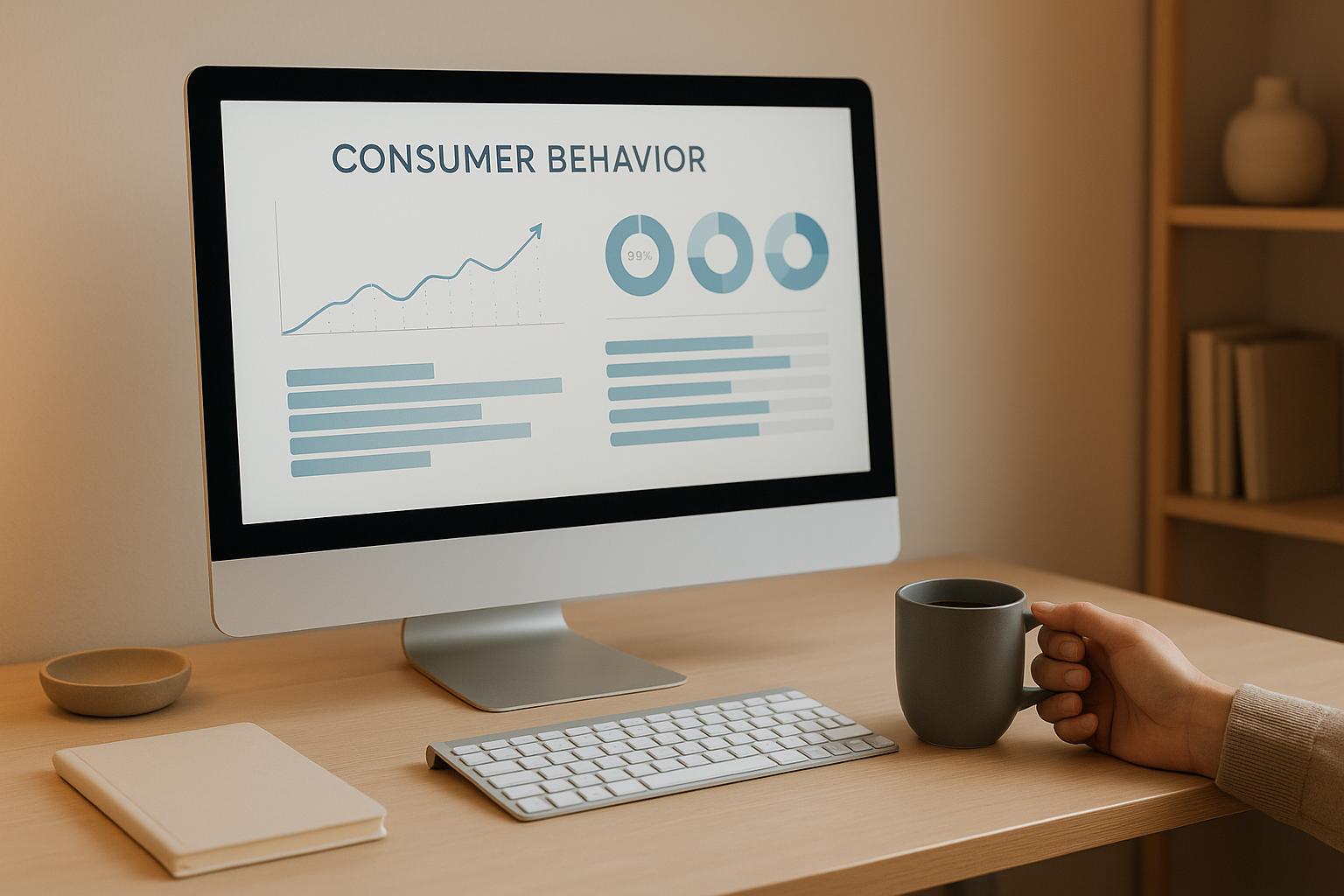Companies today need fast, accurate consumer insights to keep up with changing markets. Traditional research methods are slow, expensive, and full of logistical hurdles. AI-powered research tools now offer a faster, cost-effective alternative, delivering insights in minutes instead of weeks.
Key Takeaways:
- Traditional Challenges: Research can take 6–12 weeks and cost $50,000–$250,000, often leading to outdated or missed opportunities.
- AI-Powered Solutions: Platforms like Syntellia use AI to simulate consumer behavior, cutting costs by 90% and delivering insights in 30–60 minutes.
- Advantages:
- Instant virtual respondent generation.
- No privacy concerns or recruitment hassles.
- Real-time adjustments for more precise data.
AI-driven tools are reshaping how businesses gather consumer insights, making decisions faster, cheaper, and more efficient. If you're still relying on slow methods, you're falling behind.
Traditional Consumer Research: Challenges and Limits
Traditional research methods, while once reliable, often fail to keep pace with today’s fast-moving markets, leading to delays that can hinder decision-making.
Time and Cost Barriers
Traditional research requires substantial investments in recruitment, facilities, and data analysis. These processes take time - so much so that by the time insights are gathered, market conditions may have already shifted. This lag can leave businesses making decisions based on outdated information, which can negatively impact marketing campaigns, product launches, or strategic adjustments.
Because of these high costs and extended timelines, companies often limit such research to big, high-stakes decisions. This cautious approach can result in missed opportunities to make smaller, yet impactful, improvements. The delays and limitations of traditional research highlight the need for alternatives that deliver quicker, more actionable insights.
Operational Problems
Beyond costs and timing, operational hurdles also weigh down traditional research. Recruiting participants, especially those from niche demographics like healthcare professionals or luxury car buyers, can be a logistical nightmare. Add to that the challenges of coordinating across different regions, managing privacy regulations, and resolving scheduling conflicts, and the process becomes even more cumbersome.
For companies seeking a diverse and representative sample, these hurdles can lead to compromises. Relying on local facilities introduces inconsistencies, and traditional methods often attract participants who are more available or comfortable in research settings, creating potential sample biases. On top of that, issues like survey fatigue or unintended influence from moderators can further distort results.
These obstacles underscore the pressing need for research methods that are faster, more reliable, and better suited to today’s dynamic business environment.
AI-Powered Synthetic Research: A Game-Changer
Traditional research methods often face hurdles like long timelines and logistical challenges. Enter AI-powered synthetic research - a faster, more precise, and cost-efficient way to gather consumer insights. Let’s explore how this approach is reshaping the way we understand audiences.
What Is Synthetic Research?
Synthetic research uses AI to replicate real consumer behavior, bypassing the need for human participants. Instead of recruiting people, it relies on AI-generated personas that mimic the behaviors, preferences, and decision-making patterns of target audiences. These personas are built using vast amounts of consumer data, allowing researchers to gain insights that closely align with what real people would say or do.
This technology delivers impressive accuracy. For example, in 2025, EY collaborated with a synthetic data company to test its annual brand-survey questionnaire targeting CEOs of U.S. companies with over $1 billion in revenue. They used 1,000 synthetic personas, achieving a 95% correlation with the actual survey results. Even better, the synthetic survey was completed in just days, compared to the months required for traditional methods - and at a fraction of the cost.
The secret lies in machine learning models trained on extensive datasets. These models don’t just spit out random answers; they consider context, demographics, and behavioral patterns to simulate real decision-making processes.
Key Features of AI-Driven Tools
AI-powered platforms offer a host of features that streamline and enhance research processes:
- Real-time iteration and analysis: Researchers can tweak questions, test new scenarios, and explore different angles instantly. AI handles the analysis, spotting patterns and generating insights within minutes.
- Automation: Beyond crunching numbers, AI tools can identify trends, highlight key takeaways, and even draft initial recommendations - cutting research time from weeks to mere minutes.
- Unlimited audience simulation: Whether targeting Fortune 500 CEOs, rural millennials, or healthcare professionals, AI can generate virtual respondents on demand, eliminating the need for recruitment or scheduling.
These capabilities not only speed up research but also ensure adaptability, allowing businesses to make quick, informed decisions in fast-moving markets. The numbers back it up: 58% of researchers currently use generative AI for data analysis, and 54% rely on it for report writing.
Privacy and Compliance Benefits
One of the standout advantages of synthetic research is its ability to sidestep privacy concerns. Since the research involves AI-generated personas rather than real people, there’s no need for consent forms, and the risks of data breaches or identity exposure are entirely removed. This simplifies compliance with regulations like GDPR and eliminates the need for complex data handling protocols.
By removing the recruitment process, companies can also explore sensitive topics without worrying about ethical dilemmas or legal risks. For instance, WeightWatchers found that participants were more open when interacting with AI rather than human researchers, reducing bias and enabling richer, more nuanced data collection.
Synthetic research also addresses survey fatigue - a growing issue as consumers tire of constant research requests. AI respondents don’t get bored, rushed, or drop out midway, ensuring consistent and reliable data across all studies.
The shift toward synthetic data is gaining momentum. 52% of researchers already use synthetic data to replace human input in some areas, and 71% believe it will dominate data collection within the next three years.
Minutes vs Days: A Direct Comparison
Traditional research methods often stretch over weeks and come with hefty price tags, sometimes running into hundreds of thousands of dollars. These lengthy timelines can slow down decision-making and lead to missed opportunities, especially in fast-paced industries.
AI-powered research, on the other hand, flips the script. Platforms like Syntellia can deliver actionable insights in just 30–60 minutes. This speed allows for real-time tweaks to research questions, audience targeting, or messaging - without needing to start over. The ability to quickly adapt and rerun studies supports agile, data-driven decisions that keep up with the pace of modern markets.
Comparison Table: Standard vs AI-Powered Research
Here’s a side-by-side look at how traditional research stacks up against AI-driven synthetic research:
| Factor | Traditional Research | AI-Powered Synthetic Research |
|---|---|---|
| Timeline | 6–12 weeks | 30–60 minutes |
| Cost Range | $50,000–$250,000 per study | Up to 90% cost savings |
| Participant Recruitment | Manual and time-consuming | Instant virtual respondent generation |
| Data Privacy Risk | Higher due to real participant data | None - no personal data is collected |
| Scalability | Limited by recruitment constraints | Unlimited audience access |
| Iteration Speed | Slow, requiring new studies | Real-time adjustments |
| Accuracy | Variable, prone to response biases | Consistent 90% behavioral accuracy |
| Geographic Reach | Often restricted to specific areas | Global reach, instant access |
| Sample Size Flexibility | Fixed and expensive to expand | Easily adjustable |
| Compliance Requirements | Extensive (e.g., consent, regulations) | Minimal, with built-in privacy protections |
This comparison highlights how AI-powered research not only saves time and money but also offers unmatched flexibility, scalability, and accuracy.
sbb-itb-2b2bc16
Ensuring Accuracy and Reliability in AI-Driven Insights
When it comes to making effective decisions, quick insights are only useful if they're accurate. The real challenge lies in keeping AI models updated to ensure they deliver precise results. Accuracy and speed go hand in hand when it comes to reshaping consumer research.
Validating Synthetic Models
Platforms like Syntellia excel at producing insights that mirror real consumer behavior. What sets them apart is their ability to adapt in real time. This means businesses can tweak questions or scenarios as trends shift, ensuring the insights stay relevant and reliable.
Tackling Challenges in AI Research
Ensuring accuracy is just one part of the equation - addressing challenges like model bias and data authenticity is equally important. Synthetic research helps by providing consistent responses, eliminating individual variations, and sidestepping privacy risks. With built-in privacy safeguards, businesses can focus on making informed, data-driven decisions without the fear of breaches or complex consent management.
Conclusion: Changing Consumer Insights with AI
AI-driven research is reshaping how businesses understand their customers, cutting down the time it takes to gather insights from weeks to just minutes. With speed, cost savings, and privacy safeguards now at the forefront, companies of all sizes can access insights that were once only available to organizations with massive budgets.
The combination of speed and precision is breaking down traditional barriers. Synthetic research achieves 90% behavioral accuracy while slashing costs by up to 90%. Its real-time adaptability lets businesses adjust their research as needed, transforming it from a one-off task into an ongoing tool for smarter decision-making. Plus, it sidesteps the privacy concerns and logistical headaches tied to recruiting real participants.
For businesses aiming to stay ahead, the real question isn't whether to use AI-powered research - it’s how fast they can make it part of their strategy. Companies that adopt synthetic research now will gain a clear edge in understanding and meeting consumer demands, while others are left waiting on the slower, traditional methods.
The game has changed, and consumer insights are now delivered in minutes, not days.
FAQs
How does AI-powered synthetic research deliver accurate consumer insights faster than traditional methods?
AI-powered synthetic research leverages cutting-edge tools like synthetic panels, predictive analytics, and similarity scoring to replicate consumer behavior on a large scale. These technologies process massive datasets in record time, delivering actionable insights in minutes instead of days.
With this method, businesses can explore various scenarios, dig into the underlying drivers of consumer actions, and make well-informed decisions backed by data. By simplifying the research process, AI ensures precision while maintaining speed, giving you a competitive edge in a rapidly changing market.
What are the privacy considerations when using AI-generated personas in consumer research?
Using AI-generated personas in consumer research offers a smart way to safeguard privacy. These synthetic personas eliminate the need to gather and store sensitive personal data linked to real individuals. Since they're not connected to any actual person, the risk of data breaches or misuse of personal information is significantly reduced.
That said, it’s crucial to ensure the AI models behind these personas are trained using ethically sourced, anonymized data. This approach not only aligns with privacy laws like GDPR and CCPA but also ensures the insights derived are both reliable and useful.
How can businesses use AI-powered research tools to improve decision-making and get faster insights?
Businesses can improve decision-making and gain quicker insights by using AI-powered research tools in their operations. These tools help simulate consumer behavior, assess potential markets, and handle sensitive data securely, ensuring privacy remains intact.
With synthetic respondent modeling, companies can rapidly produce dependable data that reflects actual consumer patterns. This method proves particularly useful when speed is essential, or when conventional research methods are too time-consuming or expensive. Adding automated data analysis to the mix ensures that insights are not only precise but also practical, empowering businesses to make faster, data-driven decisions.


